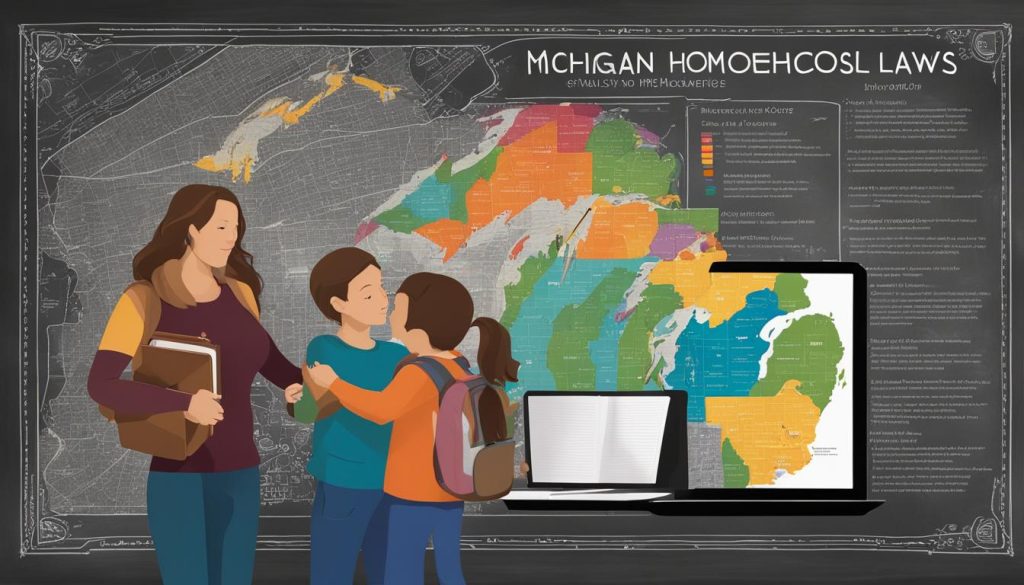When it comes to homeschooling in Michigan, it’s important to have a clear understanding of the laws and regulations that govern this educational option. This article provides a simplified guide to help you navigate Michigan’s home school laws, including requirements, regulations, and eligibility. Please note that while we strive to provide accurate information, it’s always advisable to consult with your local school board and review the official Michigan state laws for the most up-to-date guidance.
Key Takeaways:
- Michigan has favorable homeschooling laws, making it a popular choice for families seeking alternative education options.
- Parents are responsible for providing an organized educational program that covers the required subjects outlined in the state’s homeschooling laws.
- No teacher certification is required to homeschool in Michigan.
- Any parent or guardian is eligible to homeschool as long as they meet the educational program requirements and cover the necessary subjects.
- Unschooling is legal in Michigan, as long as the curriculum and subject requirements are met.
Is it easy to homeschool in Michigan?
Homeschooling in Michigan is generally considered to be easy and straightforward. According to Sonlight families who are homeschooling in the state, there is no need for registration, reporting, or testing. Michigan is classified as a no notice, low regulation state by the Home School Legal Defense Association (HSLDA), making it a favorable environment for homeschooling families.
| Advantages of Homeschooling in Michigan | Challenges of Homeschooling in Michigan |
|---|---|
|
|
With the freedom to choose your own curriculum and teaching methods, homeschooling in Michigan allows families to tailor their child’s education to their individual needs and interests. This flexibility can make the homeschooling experience enjoyable and rewarding for both parents and students.
However, it’s important to note that homeschooling requires self-discipline, organization, and active involvement from parents or guardians. Creating lesson plans, sourcing materials, and providing social opportunities outside of the traditional school setting are essential for a well-rounded homeschooling experience.
Overall, Michigan’s homeschooling laws make it a favorable state for families who wish to take control of their child’s education and create a personalized learning environment.
Is homeschooling regulated in Michigan?
While homeschooling in Michigan is not heavily regulated, there are certain requirements outlined in the state’s homeschooling laws. Parents are responsible for providing an organized educational program that covers subjects such as reading, spelling, math, science, history, civics, literature, writing, and English grammar. However, there are no mandatory reporting, testing, or registration requirements for homeschoolers.
Michigan’s homeschool regulations prioritize flexibility and autonomy for families. As long as parents ensure their children receive a comprehensive education that covers the required subjects, they have the freedom to tailor their approach to fit their child’s individual needs and learning style.

| Regulations | Requirements |
|---|---|
| No Mandatory Reporting | Parents are not required to submit annual reports or notify the state education department. |
| No Mandatory Testing | Standardized testing is not required for homeschoolers in Michigan. |
| No Mandatory Registration | There is no need to register with any regulatory body or authority. |
These lenient regulations provide Michigan homeschooling families with the freedom to customize their educational approach and curriculum. Parents are empowered to choose the resources, materials, and teaching methods that best align with their child’s interests, strengths, and learning goals.
Parental Responsibility and Accountability
Although Michigan homeschooling laws do not impose strict regulations, parents hold the responsibility to ensure their children receive a quality education. Parents are encouraged to maintain records of their child’s coursework, activities, and progress as evidence of an organized educational program.
Homeschooling offers families the flexibility to create a personalized learning experience tailored to the unique needs of their children, all while adhering to Michigan’s homeschooling laws.
By maintaining samples of work, grades for assignments, quizzes, and tests, parents can demonstrate their commitment to academic standards. While standardized testing is not mandatory, some parents may choose to administer these tests to assess their child’s progress and to document their educational achievements.
Next, we’ll explore the popularity of homeschooling in Michigan and why families choose this alternative educational path.
Is Homeschooling Popular in Michigan?
Homeschooling in Michigan has gained significant popularity, with approximately 5% of the student population being homeschooled. This trend mirrors the nationwide increase in families choosing homeschooling as an alternative form of education.
Parents in Michigan are opting for homeschooling for various reasons, such as a desire for customized education, flexibility in curriculum choices, and a more personalized learning environment for their children.
Homeschooling offers families the freedom to tailor education to their child’s individual needs, allowing for focused attention and flexible scheduling. Additionally, parents can instill their values, beliefs, and cultural heritage into their child’s education.
Michigan’s homeschooling laws provide the legal framework for families to pursue this educational path, ensuring that parents have the right to educate their children at home and granting them the autonomy to create a rich and rewarding learning experience.

Please note: The image above depicts a homeschooling environment in Michigan and is for illustrative purposes only.
What are Homeschool Requirements in Michigan?
Michigan has minimal requirements for homeschooling. Unlike other states, there are no specific school day or hour requirements, no letter of intent, no mandatory reporting, and no standardized testing. This provides flexibility and autonomy for parents who choose to educate their children at home.
However, it’s important to note that while the state has minimal requirements, parents must still provide an organized educational program that covers the required subjects outlined in Michigan’s homeschooling laws. These subjects typically include:
- Reading
- Spelling
- Math
- Science
- History
- Civics
- Literature
- Writing
- English Grammar
Parents have the flexibility to choose the curriculum and teaching methods that best suit their child’s needs and learning style. They can tailor the educational program to align with their child’s interests, abilities, and goals.
While Michigan homeschool requirements may be minimal, it’s crucial for parents to prioritize their child’s education and ensure they receive a well-rounded and comprehensive learning experience.
Example of a Homeschool Schedule
Creating a structured schedule can help homeschooling families stay organized and ensure that all required subjects are covered adequately. Here’s an example of a homeschool schedule that can be adapted to suit your child’s needs:
| Time | Subject |
|---|---|
| 9:00 AM – 10:00 AM | Reading |
| 10:00 AM – 11:00 AM | Math |
| 11:00 AM – 11:15 AM | Break |
| 11:15 AM – 12:15 PM | Science |
| 12:15 PM – 1:00 PM | Lunch |
| 1:00 PM – 2:00 PM | History |
| 2:00 PM – 3:00 PM | Civics |
| 3:00 PM – 3:15 PM | Break |
| 3:15 PM – 4:15 PM | Literature |
| 4:15 PM – 5:00 PM | Writing |
Do you have to be certified to homeschool in Michigan?
No teacher certification is required to homeschool in Michigan. As a parent or guardian, you have the eligibility to educate your children at home without the need for any formal teaching qualifications. Instead, Michigan homeschool laws focus on the educational program and subjects covered.
Michigan homeschool laws prioritize an organized educational program that encompasses essential subjects such as reading, spelling, math, science, history, civics, literature, writing, and English grammar. By meeting these requirements, you can provide your children with a well-rounded education from the comfort of your own home.
It’s important to note that while teacher certification is not necessary, your commitment to your child’s education and meeting the educational program requirements are crucial. You have the freedom to tailor the curriculum to your child’s needs and learning style, ensuring a personalized and effective educational experience.

Who is eligible for homeschooling?
Homeschooling is legal in Michigan for any parent or guardian as long as they meet the educational program requirements and cover the required subjects. Everyone is eligible to homeschool, as long as they meet the college degree requirement or qualify for a religious exemption.
Michigan homeschool laws 2021 allow parents or guardians to take charge of their child’s education and tailor it to their individual needs. Whether you have a college degree or choose to homeschool for religious reasons, you have the eligibility to provide your child with a personalized education in the comfort of your home.
College Degree Requirement
Maintaining a college degree is not mandatory for homeschooling in Michigan. However, to meet the eligibility criteria, parents or guardians must provide an organized educational program that includes the required subjects outlined by the state’s homeschooling laws. As long as you can offer a comprehensive curriculum that covers topics such as reading, math, science, history, and writing, you can homeschool your child even without a college degree.
Religious Exemption
If you do not hold a college degree but wish to homeschool for religious reasons, you can still meet the eligibility criteria. Michigan homeschool laws recognize religious exemptions, allowing parents or guardians to educate their child at home according to their religious beliefs. To qualify for a religious exemption, you must demonstrate your sincere religious beliefs and ensure you provide a suitable educational program that aligns with those beliefs.
If you meet either the college degree requirement or qualify for a religious exemption, you are eligible to embark on the homeschooling journey in Michigan and provide your child with a personalized and flexible education tailored to their unique needs and aspirations.

Is unschooling legal in Michigan?
Unschooling is a legitimate and legal homeschooling approach in Michigan, provided that the curriculum and subject requirements are met. Unlike traditional homeschooling methods, unschooling places a greater emphasis on child-led learning and exploration, allowing children to pursue their interests and passions at their own pace.
Michigan homeschool laws do not specifically address or regulate unschooling as a separate category, which means that unschooling families have the same rights and responsibilities as other homeschoolers in the state.
Under Michigan homeschool laws, parents or guardians are required to provide an organized educational program and cover the necessary subjects, such as reading, spelling, math, science, history, civics, literature, writing, and English grammar. However, there is no specific affidavit or additional documentation required for unschooling.
Unschooling allows children to learn through real-life experiences, self-directed projects, and their own natural curiosity. It promotes independent thinking, creativity, and a love for learning. By following their interests and passions, unschooling allows children to develop critical thinking skills and take ownership of their education.
Benefits of Unschooling in Michigan
Unschooling offers several advantages for families in Michigan who choose this homeschooling approach:
- Flexibility: Unschooling allows families to design a personalized learning plan tailored to their child’s unique interests and learning style.
- Individualization: With unschooling, children have the freedom to explore topics that fascinate them and dive deeper into those subjects without being limited by a prescribed curriculum.
- Hands-on Learning: Unschooling encourages hands-on experiences, field trips, and real-life learning opportunities, enabling children to make connections between academic concepts and the world around them.
- Higher Engagement: By following their passions and interests, unschoolers tend to be more engaged and motivated learners, making their education a meaningful and enjoyable experience.
Unschooling provides a unique educational approach that can be incredibly rewarding for families in Michigan. It offers the flexibility and freedom to tailor education to each child’s individual needs, interests, and learning style. With a supportive and nurturing environment, unschooling can foster a lifelong love of learning and a genuine thirst for knowledge.
Can I homeschool someone else’s child in Michigan?
When it comes to homeschooling in Michigan, the law clearly states that parents or guardians have the right to educate their own children at home. This means that as a parent or legal guardian, you have the authority and responsibility to make decisions regarding your child’s education. While it is possible to outsource certain aspects of your child’s education, such as enrolling them in online classes or hiring a tutor, it is important to remember that the ultimate responsibility for their education lies with you.
Michigan homeschooling laws are designed to give parents the freedom and flexibility to tailor their child’s education to their specific needs and goals. By taking on the role of their primary educator, you have the opportunity to shape and personalize their learning experiences, ensuring they receive a high-quality education.
Whether you choose to homeschool your own child or someone else’s child, it is essential to consider the legal implications and responsibilities involved. It’s important to note that homeschooling laws may vary from state to state, so it’s crucial to familiarize yourself with the specific regulations and requirements in Michigan.
By understanding and complying with Michigan homeschool laws, you can confidently embark on your homeschooling journey, providing a nurturing and enriching educational experience for the child you are responsible for.
| Homeschooling in Michigan | |
|---|---|
| Legal Requirement | Parent or guardian has the right to educate their child at home |
| Responsibilities | Ultimate responsibility lies with the parent or guardian |
| Freedom and Flexibility | Ability to tailor the child’s education to their specific needs and goals |
| Legal Implications | Understanding the specific regulations and requirements in Michigan |
Do you need to report homeschooling in Michigan?
One of the advantages of homeschooling in Michigan is that there is no requirement for reporting your homeschooling journey. Unlike in some other states, you are not obligated to submit regular reports or assessments to the Michigan Department of Education.
However, it is recommended that you officially withdraw your child from public school to avoid any potential truancy issues. This step ensures that your child’s absence from the public school system is understood and accounted for.
While reporting is not mandatory, some parents choose to voluntarily report their homeschool to the Michigan Department of Education on an annual basis. This allows homeschooling families to maintain a positive relationship with local school officials and stay informed about any changes or updates in Michigan homeschool laws.
If your child has special needs and requires special education services, reporting to the Michigan Department of Education may be necessary to access the appropriate support and resources for your child’s education.
Remember, the decision to report or not report your homeschooling is entirely up to you, and there are no legal consequences for choosing not to report.
As always, it’s important to stay informed about the specific homeschooling laws in Michigan and consult with local homeschooling organizations or support groups to understand any recent developments or changes in reporting requirements.
Benefits of Reporting:
- Establish a positive relationship with local school officials
- Stay informed about Michigan homeschool laws
- Access resources and support for special education services if needed
“While reporting is not mandatory in Michigan, voluntarily reporting your homeschool can help foster a cooperative relationship with local school officials and provide valuable information on educational resources and updates.” – Michigan Homeschool Association
By maintaining open communication with the officials, you can ensure a positive homeschooling experience for you and your child.
To summarize, reporting homeschooling in Michigan is not required by law, but it is recommended to officially withdraw your child from public school. Voluntary reporting can provide benefits such as staying informed about homeschool laws and establishing connections with local school officials, while also accessing resources for special education services if needed.
The Key to Michigan Homeschooling Requirements: An Organized Educational Program
Michigan homeschooling requirements revolve around the provision of an organized educational program that covers the required subjects. It is essential for homeschooling parents in Michigan to ensure that their curriculum includes the following subjects:
- Reading
- Spelling
- Math
- Science
- History
- Civics
- Literature
- Writing
- English grammar
In addition to these core subjects, high school homeschooling in Michigan introduces additional requirements related to civic education.
Providing an organized educational program ensures that homeschooled students receive a comprehensive education across various disciplines, enabling them to develop a well-rounded knowledge base. It is important to note that while Michigan homeschool laws do not impose strict regulations, adhering to an organized curriculum helps maintain quality education standards for homeschooled students.
What Proof is Required for Homeschooling in Michigan?
When it comes to homeschooling in Michigan, there is no formal avenue for homeschool accountability. However, it is highly recommended to keep records as proof of the organized educational program and student progress. By maintaining samples of work, grades for assignments, quizzes, and tests, you can provide evidence of your child’s education.
Standardized testing is not mandatory for homeschoolers in Michigan, offering flexibility when it comes to assessing your child’s academic development. Instead, the focus is on ensuring that an organized educational program is in place, covering the subjects required by Michigan homeschool laws. While you may not be required to submit these records to any official authority, keeping them on hand can provide reassurance for yourself and demonstrate your commitment to your child’s education.
As you navigate homeschooling in Michigan, it’s crucial to stay informed about the latest Michigan homeschool laws and regulations to ensure compliance. By maintaining proper documentation, you can confidently meet any potential inquiries or requests for proof of your child’s educational progress throughout their homeschool journey.
FAQ
Is it easy to homeschool in Michigan?
Yes, homeschooling in Michigan is generally considered to be easy and straightforward. There are no registration, reporting, or testing requirements for homeschoolers in the state.
Is homeschooling regulated in Michigan?
While homeschooling in Michigan is not heavily regulated, there are certain requirements outlined in the state’s homeschooling laws. Parents are responsible for providing an organized educational program that covers required subjects, but there are no mandatory reporting, testing, or registration requirements.
Is homeschooling popular in Michigan?
Yes, homeschooling accounts for approximately 5% of the student population in Michigan, reflecting the national trend of homeschooling being a popular choice for families seeking alternative education options.
What are homeschool requirements in Michigan?
Michigan homeschool requirements entail providing an organized educational program that covers subjects such as reading, spelling, math, science, history, civics, literature, writing, and English grammar. However, there are no specific school day or hour requirements, no letter of intent, and no standardized testing.
Do you have to be certified to homeschool in Michigan?
No, there is no teacher certification required to homeschool in Michigan. Parents or guardians are eligible to educate their children at home as long as they meet the educational program requirements and cover the necessary subjects.
Who is eligible for homeschooling in Michigan?
Homeschooling is legal in Michigan for any parent or guardian who meets the educational program requirements and covers the required subjects. Everyone is eligible to homeschool, as long as they meet the college degree requirement or qualify for a religious exemption.
Is unschooling legal in Michigan?
Yes, unschooling is legal in Michigan as long as the curriculum and subject requirements are met. There is no specific affidavit or additional documentation required for unschooling in the state.
Can I homeschool someone else’s child in Michigan?
The law in Michigan states that parents or guardians have the right to educate their own children at home. While parents can outsource teaching or enroll a child in online classes, the responsibility ultimately lies with the parent or guardian.
Do you need to report homeschooling in Michigan?
There is no requirement for reporting homeschooling in Michigan. However, it is recommended to officially withdraw your child from public school to avoid any truancy issues. The annual reporting of a home school to the Michigan Department of Education is voluntary, unless the student has special needs and is requesting special education services.
What proof is required for homeschooling in Michigan?
While there is no formal avenue for homeschool accountability in Michigan, it is advisable to keep records to demonstrate the use of an organized educational program and to track student progress. This can include keeping samples of work and grades for assignments, quizzes, and tests, but standardized testing is not mandatory.






